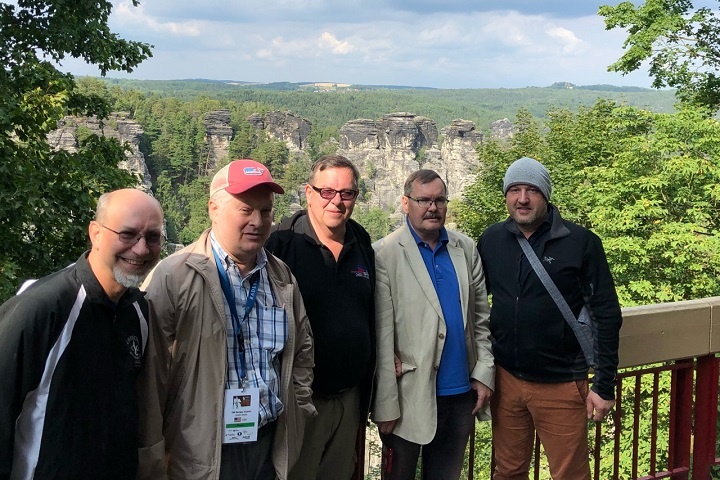Day six report
We switched plans in our cultural enrichment program after we beat Austria 3-1. We did not go to the Karl May museum, as it was promised at the end of my previous report. Instead, we succumbed to the allure of visiting Altstadt (Old Town), Dresden and having a very nice dinner at the Kastenmeiers restaurant, which serves excellent sea bass. A walk alongside some majestic buildings followed.

A bit of more recent history here — old DDR period cars called Trabant
We had submitted our line-up for the next match before the pairings were made. In retrospect, maybe I should have played, but the rotation called for me to sit that one out.
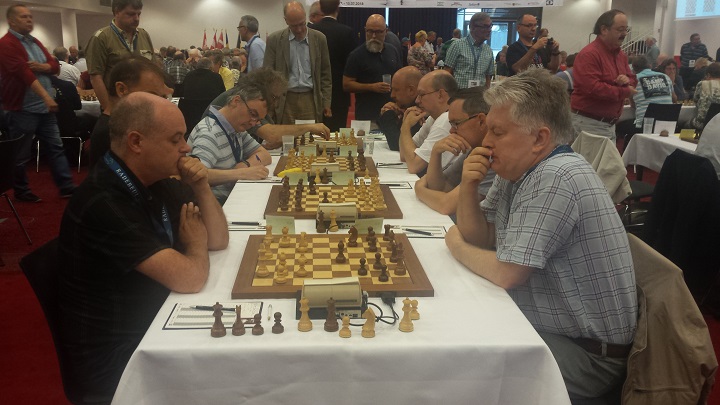
The English did better at chess than at football this week
A critical match in round four saw England beat USA by the count of 2½-1½. The English played real well.
On board three, James Plaskett withstood some terrible pressure against Jaan Ehlvest and escaped in a drawn exchange-down endgame.
Meanwhile, on board one, Jonathan Speelman survived a difficult middlegame position and at some point obtained a +5 advantage. Shabalov considers himself lucky after having split the point.
The margin of victory was provided on board two.
Great players always had and still have more than just broad theoretical knowledge. Every of them has some favourite methods, which simply help to score more points. The greatest even have favourite pawn structures! And they immediately exploited the knowledge of others - Alekhine invented some interesting structures, which were copied by his opponent in that game (Rubinstein), and later exploited by Botvinnik and then by Kramnik!
Beaten but not broken, the US Team went to the Karl May Museum, where we learned an important fact: contrary to what was stated in my previous report Karl May did visit the United States towards the end of his life. He travelled to Upstate New York to visit some Indian tribes and went all the way to Niagara Falls.
The rest of the evening was spent in front of the TV watching France vs Belgium, the first World Cup semi-final. The team members' sympathies were more of less evenly split, but the French faction won.
The next day we played SC Empor Potsdam 1952. Captain Shabalov took a day off, but Joel Benjamin came back roaring and the team won 3½-½.
Later the same day, we hit the high (in two senses of the word) point in our journey, when we visited the world famous Saxon Switzerland National Park.
For our American consumers, I will dub it the German Grand Canyon.
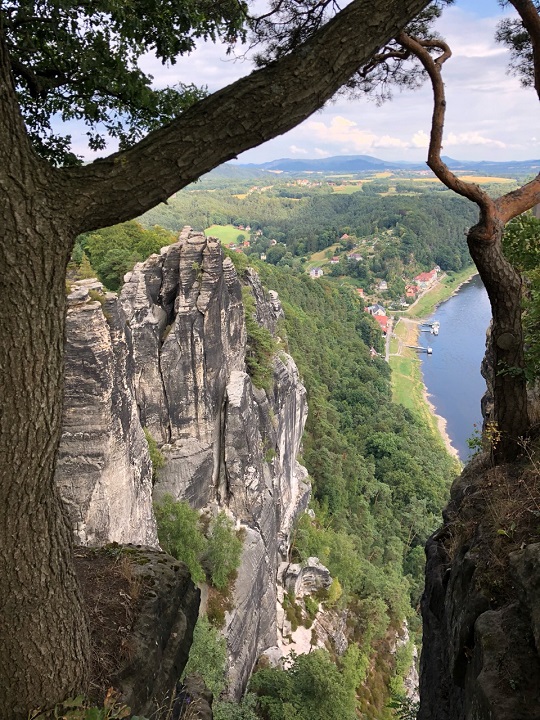
A majestic view (click or tap to enlarge)
The park is only 45 minutes away by car. It took us longer to figure out how to use Kassenautomat to pay for parking.

The Elbe, one of the major rivers of Central Europe
Of course, it's the same river that flows through downtown Dresden.

Good old friends
A bit of hiking didn't spoil our appetite.
When we came to Germany, all of Central Europe was gripped by a heat wave. It has subsided now — we have had some rain, and last night sitting outdoors up there was even a bit chilly.
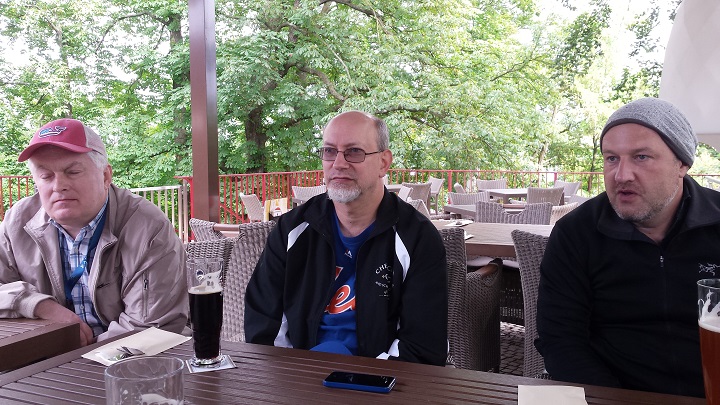
The weather is different at such heights
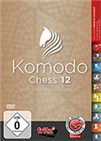 In computer chess there is no getting past Komodo, a two-time ICGA Computer World Chess Champion. Find out how Komodo can take your game to the next level!
In computer chess there is no getting past Komodo, a two-time ICGA Computer World Chess Champion. Find out how Komodo can take your game to the next level!Having lost two match points really hurts our team chances in the race for gold. Now we absolutely need to win all remaining matches, while holding a hope that the English team will stumble.
Stumble they did the very next day, but only on the football pitch. Once again, our team was watching the game (this time England-Croatia) together, and had to make-do with a dinner of green salad, soup and cold cuts, which your favourite writer slapped together in short order.
Today, we played our best match of the tournament and beat Germany 1 by the huge margin of 3½-½. I was the only one who didn't win, but of course I was never better with Black against IM Karsten Volke.
By his own admission, Joel won an important game, not only in terms of the overall team success.
Some may find it amusing, but I can relate to Joel's plight. Giving chess lessons for a living while raising two children doesn't leave a whole lot of time for advancing one's own chess. My readers must have noticed that I no longer include large open tournaments in my schedule. Thus, there is a shortage of opportunities to meet and beat your fellow Grandmasters.
Obviously, Alex Shabalov is an exception. Years ago, he made a wise decision — to have all the kids he was ever going to have before turning 30. Now Shabba is a grandfather at 50, blessed by excellent health, maintained by lengthy sessions in the gym, daily yoga classes and walking his dog, Eevee.
Like a fine wine, the Four Knights only improves with age, establishing itself as an extremely effective way of meeting 1...e5. On the outside this opening seems deceptively quiet, yet apparently natural moves can often lead to some devastating attacks.
The overall impression of Dresden is very positive. The city doesn't seem terribly crowded, and it offers a nice mix of things old and new. We have been to a mall and various grocery stores — anything you need can be found there. Jaan Ehlvest was able to buy a replacement power cord for his computer without any hassle, while the store next door didn't disappoint him with its supply in the beverage aisle.
No wonder Jaan is playing a very strong tournament.
Three more rounds to go, and we're trailing both England and the Lasker Team by one match point. We need help.
Links
